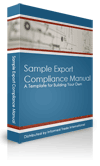ITAR Exemption Codes
Here’s a list of ITAR exemptions that may apply to your product. Please note the date of this article when using the table.
DDTC ITAR Exemption Codes
| Code | Description |
|---|---|
| 123.4A1 | 22 CFR 123.4 (a) (1) Temporary import of U. S. – origin defense items for servicing, inspection, testing, calibration, repair, overhaul, reconditioning, or one-to-one replacement of defective items. |
| 123.4A2 | 22 CFR 123.4 (a) (2) Temporary import of U.S. – origin defense item to be enhanced, upgraded, or incorporated into another item which the permanent export has been authorized by Directorate of Defense Controls. |
| 123.4A3 | 22 CFR 123.4 (a) (3) Temporary import of U.S. – origin defense items for demonstration or marketing. |
| 123.4A4 | 22 CFR 123.4 (a) (4) Temporary import of U.S. – origin defense items which have been rejected for permanent import by Treasury. |
| 123.4A5 | 22 CFR 123.4 (a) (5) Temporary import of U.S. – origin defense items approved for import under Foreign Military Sales Program. |
| 123.4B | 22 CFR 123.4 (b) Temporary import but not subsequent export of item incorporated into another article. |
| 123.6 | 22 CFR 123.6 From the United States to foreign trade zone or Customs bonded warehouse. |
| 123.9E | 22 CFR 123.9 (e) Re-export or retransfer of U.S. – origin items incorporated into foreign defense article to a government of a NATO country or the governments of Australia or Japan. |
| 123.11B | 22 CFR 123.11 (b) Vessel or aircraft does not enter territorial waters or airspace if no defense articles are carried as cargo. |
| 123.12 | 22 CFR 123.12 Shipments between U.S. possessions. |
| 123.13 | 22 CFR 123.13 Defense article on domestic air shipment via foreign country. |
| 123.16B1 | 22 CFR 123.16 (b) (1) Defense articles in support of agreements. |
| 123.16B2 | 22 CFR 123.16 (b) (2) Components or spare parts less than $500. |
| 123.16B3 | 22 CFR 123.16 (b) (3) Packing cases for defense articles. |
| 123.16B4 | 22 CFR 123.16 (b) (4) Models and mock-ups. |
| 123.16B5 | 22 CFR 123.16 (b) (5) Temporary export for public exhibition, trade show, air show or related event if that article was previously licensed for public exhibition. |
| 123.16B9 | 22 CFR 123.16 (b) (9) Temporary export of unclassified component, part, tool or test equipment to affiliate or facility owned or controlled by the U.S. person. |
| 123.17A | 22 CFR 123.17 (a) Components and parts for Category I (a) firearms not exceeding $100 wholesale. |
| 123.17B | 22 CFR 123.17 (b) Non-automatic Category I (a) firearms manufactured in or before 1898 or replica. |
| 123.17C | 22 CFR 123.17 (c) Temporary export of no more than three non-automatic Category I (a) firearms and no more than 1,000 cartridges. |
| 123.17D | 22 CFR 123.17 (d) Firearms for foreign persons brought in under 27 CFR 178.115 (d). |
| 123.17E | 22 CFR 123.17 (e) Not more than 1,000 cartridges of ammunition for non-automatic firearms for personal use. |
| 123.17F | 22 CFR 123.17 (f) Temporary export of one set of “Body Armor” for personal use without a license from the United States by an individual (U.S. person). Companies cannot use this exemption. |
| 123.17G | 22 CFR 123.17 (g) Temporary export of one set of “Body Armor” for personal use without a license going to Afghanistan and to Iraq. Companies cannot use this exemption. |
| 123.18A1 | 22 CFR 123.18 (a) (1) Non-automatic firearms for servicemen’s clubs for members of U.S. Armed Forces. |
| 123.18A2 | 22 CFR 123.18 (a) (2) Non-automatic firearms for personal use by member of U.S. Armed Forces or civilian employee of Department of Defense. |
| 123.18A3 | 22 CFR 123.18 (a) (3) Non-automatic firearms for personal use by U.S. Government employees. |
| 123.18B | 22 CFR 123.18 (b) Not more than 1,000 cartridges of ammunition for personal use by U.S. Government employees. |
| 123.19 | 22 CFR 123.19 Canadian and Mexican border shipments. |
| 124.2A | 22 CFR 124.2 (a) Training in basic operation and maintenance of defense articles authorized for export to the same recipient. |
| 124.2B | 22 CFR 124.2 (b) Defense services performed by U.S. persons drafted into military force of a foreign nation. |
| 124.2C | 22 CFR 124.2 (c) Maintenance training or performance training to NATO countries, Australia, Japan, and Sweden. |
| 124.3A | 22 CFR 124.3 (a) Unclassified technical data within scope of an approved manufacturing license or technical assistance agreement. |
| 124.3B | 22 CFR 124.3 (b) Classified technical data in furtherance of an approved manufacturing license or technical assistance agreement. |
| 125.2B | 22 CFR 125.2 (b) Technical data for foreign filing of patent application not exceeding its domestic patent filing. |
| 125.4B1 | 22 CFR 125.4 (b) (1) Technical data pursuant to official written request or directive of Department of Defense. |
| 125.4B2 | 22 CFR 125.4 (b) (2) Technical data in furtherance of agreement approved under 22 CFR Part 124. |
| 125.4B3 | 22 CFR 125.4 (b) (3) Technical data in furtherance of contract between exporter and U.S. Government agency that does not disclose design, development, production, or manufacture details of defense article. |
| 125.4B4 | 22 CFR 125.4 (b) (4) Copies of technical data previously authorized for export to same recipient. |
| 125.4B5 | 22 CFR 125.4 (b) (5) Technical data regarding basic operations, maintenance, and training to same recipient of lawfully exported defense article. |
| 125.4B6 | 22 CFR 125.4 (b) (6) Technical data related to firearms not in excess of .50 caliber and ammunition not in excess of .50 caliber, not including design, development, production, or manufacturing details. |
| 125.4B7 | 22 CFR 125.4 (b) (7) Technical data being returned to original source of import. |
| 125.4B8 | 22 CFR 125.4 (b) (8) Technical data directly related to classified information which has been previously authorized for export to same recipient, not including design, development, production, or manufacturing details. |
| 125.4B9 | 22 CFR 125.4 (b) (9) Technical data sent by U.S. corporation to a U.S. person employed by that corporation overseas or to a U.S. Government agency. |
| 125.4B10 | 22 CFR 125.4 (b) (10) Unclassified technical data in U.S. by U.S. institution of higher learning to full-time foreign employee. |
| 125.4B11 | 22 CFR 125.4 (b) (11) Exporter granted written exemption from Directorate of Defense Trade Controls for technical data pursuant to arrangement with Department of Defense, Department of Energy, or NASA. |
| 125.4B12 | 22 CFR 125.4 (b) (12) Technical data exempt under 22 CFR 126. |
| 125.4B13 | 22 CFR 125.4 (b) (13) Technical data for public release by cognizant U.S. Government agency or Directorate for Freedom of Information and Security Review. |
| 125.4C | 22 CFR 125.4 (c) Defense services and unclassified technical data to nationals of NATO countries, Australia, Japan, and Sweden for responding to written request from Department of Defense for quote or bid proposal. |
| 125.5A | 22 CFR 125.5 (a) Unclassified technical data during classified plant visit authorized by Directorate of Defense Trade Controls; approved government-to-government program; or U.S. Government agency having classification jurisdiction over classified defense article or classified technical data. |
| 125.5B | 22 CFR 125.5 (b) Classified technical data during plant visit approved by appropriate U.S. Government agency. |
| 125.5C | 22 CFR 125.5 (c) Unclassified technical data during plant visit approved by the Directorate of Defense Trade Controls. |
| 126.3 | 22 CFR 126.3 Exceptional or undue hardship. |
| 126.4A | 22 CFR 126.4 (a) Temporary import or temporary export of defense article, technical data, or defense service by or for agency of U.S. Government. |
| 126.4C | 22 CFR 126.4 (c) Temporary import, temporary export, or permanent export of defense article, technical data, or defense service for end-use by U.S. Government agency in foreign country. |
| 126.5A | 22 CFR 126.5 (a) Temporary import and return to Canada of unclassified defense articles originating from Canada. |
| 126.5B | 22 CFR 126.5 (b) Permanent or temporary export of certain defense articles, related technical data, and defense services for end-use in Canada. |
| 126.5C | 22 CFR 126.5 (c) Defense service or technical data to Canada. |
| 126.6A | 22 CFR 126.6 (a) Defense article or technical data sold, leased, or loaned by Department of Defense to a foreign country or international organization. |
| 126.6B | 22 CFR 126.6 (b) Foreign military aircraft or naval vessel. |
| 126.6C | 22 CFR 126.6 (c) Defense article, technical data, or defense service sold, leased, or loaned by Department of Defense under Foreign Military Sales Program. |
| 126.16E1 | United States and Australian combined military or counter-terrorism operations |
| 126.16E2 | United States and Australian cooperative security and defense research, development, production, and support programs |
| 126.16E3 | Mutually determined specific security and defense projects where the Government of Australia is the end-user |
| 126.16E4 | U.S. Government end-use |
| 126.17E1 | United States and United Kingdom combined military or counter-terrorism operations |
| 126.17E2 | United States and United Kingdom cooperative security and defense research, development, production, and support programs |
| 126.17E3 | Mutually determined specific security and defense projects where the Government of the United Kingdom is the end-user |
| 126.17E4 | U.S. Government end-use |
Posted on March 1st, 2012 by admin
Filed under: ITAR | Comments Off on ITAR Exemption Codes


